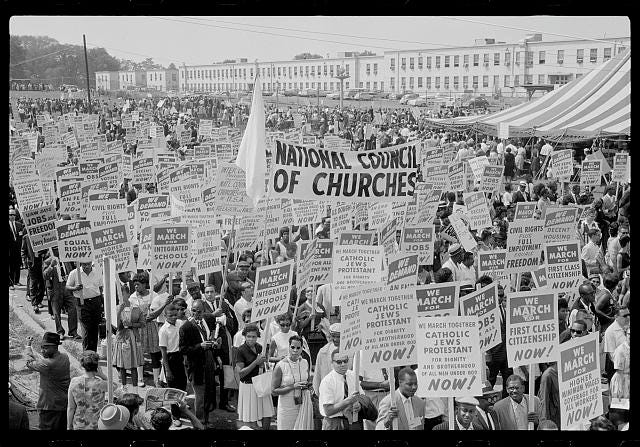Principles Going Forward
When we look back to the movements that have expanded our understandings and commitments to justice, faith leaders and communities have often been at the forefront.
As we head into next year, as a Christian, I am deeply concerned about how the most vulnerable in our society– those Jesus called, “the least of these”- will be treated. In particular, I fear for immigrants, Black and brown young people and their parents, those who will experience more poverty, members of the LGBTQ+ community, and those being most impacted by the effects of climate change– to name a few.
I’m fearful of how the rhetoric and behavior of the incoming president and his political leaders has and will continue to normalize and embolden acts of hate and violence against perceived “threats.”
Fear leads to hate which leads to violence–especially against the most marginalized in society. Many on their enemies lists will have good lawyers, the marginal will not have such legal protection.
Here are some key principles for us as people of faith going forward.
Defend the vulnerable will be a first principle for many faith communities–a clear biblical conviction, that no matter how people voted, they can be challenged to observe. Wide conversations and strategies for countering mass deportation with religious mass non-cooperation are already being discussed with white sister churches standing with Hispanic churches for immigrants and with Black churches against potential increased police violence against their young people.
Defend Dignity. For us in faith traditions that literally means defending the image of God in every person. We have learned that the best antidote to hate and violence is to offer belonging, meaning, and purpose. Religious congregations are good places to learn how to apply those against rising hate and to those who are being caught up in it. Love can be a practical answer to violence. We also believe it is time for re-commitment to and training in the principles and practices of nonviolence again in faith communities. Some of us have done that training before and we need now to do it again.
Defend Truth. Jesus said, “You will know the truth and the truth will set you free. The opposite of truth is more than lying but captivity–to lies and lying that is being normalized by this new President and his administration. And lies lead to violence. We need to find real ways to strengthen courage for pastors and others to be truth-tellers in congregations–on Sundays for Christians, Saturdays for Jews, and Fridays for Muslims– against the lies that lead to violence. That is a critical task and crucial resources that need to be developed going forward.
Defend Good Faith Over Bad Religion. The answer to bad religion is not no religion, it’s better religion. The fears of demographic change in America are being manipulated and were deep undercurrents in this election campaign. In response to those fears, many Christians are being indoctrinated into white Christian nationalism from the twisted dominionist theology (from our earliest beginnings in America) and now being pushed by many far right Christian leaders who are a part of or adjacent to the New Aposotlic Reformation movement (a network you should know) which is seeking to take over the “Seven Mountains”: (their language) of family, religion, education, media, arts and entertainment, business, and government (their targets) to produce a more Christian nation, which at its historical core is a white led nation. New Apostolic Reformation leaders were at the Capitol on January 6. Because of this, I believe Christians, in particular, have a responsibility to stand against the rising tide of Christian nationalism in the United States– for the sake of pluralism and democracy. The religious lies of white Christian nationalism can be best confronted and corrected by other people of faith.
I believe that because false religion has been at the forefront of fueling hate and violence, true faith must be at the forefront of the movement resisting autocracy and promoting and demonstrating a more inclusive, equitable, and kinder world.
When we look back to the movements that have expanded our understandings and commitments to justice, faith leaders and communities have often been at the forefront. From abolition to suffrage, from Civil Rights to ending apartheid, and from the anti-Vietnam war and Sanctuary movements, (now being renewed), leaders and communities of faith have been drum majors for justice.
We all have our part to play. Here at the Center of Faith and Justice we seek to resource faith communities, clergy and lay leaders to understand our moment, root solutions in theology more than just politics, connect them with broader movements, and equip them with the skills, strategy, and tactics they need to advocate for the common good for all– multi-faith and non-religious alike.
The coming years will require all of us to be committed to working for justice. I hope that together we find ways to push for a broader more inclusive kingdom vision.



I would pledge money to support what you are doing but am 82 and retired and am just squeaking by financially. But that's not to say I don't whole heartily believe in your work.ive been reading all that you have written and believe what you preach.
Thank you!